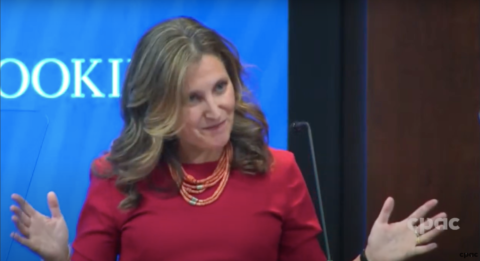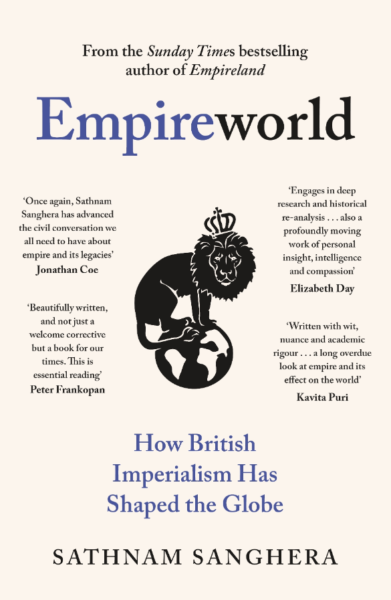In The Line, Matt Gurney recounts Deputy Prime Minister Chrystia Freeland’s terrible response to a topical question from a reporter:
In fairness, noting that Freeland, she of the infamous Disney+ flop, is bad at politics is not an original observation. I confess that. But, still. Yikes! What the hell was that?!
I’m referring to Monday’s unfortunate gaffe. Freeland was in Montreal doing post-budget stuff with the small business minister, and after touring a business, took questions from reporters. Sarah Leavitt from the CBC asked a question related to a particularly vile eruption of overt antisemitism at a protest in Ottawa last weekend. A man leading the crowd in chants said “Our resistance attacks are proof that we are almost free … Oct. 7 is proof that we are almost free. Long live Oct. 7, long live the resistance, long live the intifada, long live every form of resistance.”
Oct. 7, of course, means the Hamas rape-and-murder pogrom of Oct. 7.
By the time Leavitt quizzed Freeland, the comments in Ottawa had already been widely disseminated and, critically, condemned. Among the condemners: Freeland’s boss, Prime Minister Justin Trudeau. He’d commented via Twitter a day before Freeland faced Leavitt’s question. This ought to have been an extremely easy exchange for Freeland.
As it turns out, though, not so much, actually.
In the interests of transparency, let’s simply see in full both what Leavitt asked, and how Freeland replied.
The question was clear enough: “Over the weekend, protesters in Ottawa were heard chanting, among other things, ‘Long live October 7’ and ‘October 7 is proof that we are almost free’. Is this hate speech?”
[…]
Let’s walk through her answer, putting her reply into the discrete points she’s been trained to hit.
Phase One: Ass covering. “I wasn’t in Ottawa over the weekend. And I’m not aware of those specific reports. And so it would be just wrong of me to comment on something that I am not specifically aware of.”
Phase Two: Banal statement that favours no group in particular but mentions the key stakeholders. “What I will say is, today is a time in Canada, when antisemitism and Islamophobia are on the rise. When we have a lot … there are a lot of Canadians who are not feeling safe. In my own riding of University-Rosedale, the JCC, a really important centre for Jewish Canadians but also for all Canadians, has faced a lot of pressure. And I’ve been there to meet with people there. There’s also a mosque in my riding that faced pressure and attacks and I’ve met with the leaders there.”
Phase Three: Attempt to sound like you’re engaging with the actual question, even though you are not. “Hate speech is absolutely not acceptable. Glorifying … I mean, I can’t even say the word because it’s … you shouldn’t. It’s too terrible. And what happened on October 7 was a heinous terrorist attack. People were killed. People were raped. Women, men, children … totally unprovoked attack on civilians. That is not acceptable.”
Phase Four: Pivot back to approved talking points. “Canada recognizes Hamas as a terrorist entity and our government is very, very clear on that. We have also been really clear that there needs to be a ceasefire, that a humanitarian catastrophe is happening right now in Gaza, and Canada and Canadians are there to support the people, the suffering people, there, too.”
This is how the PM answers questions, too. It’s a pattern that, once seen, will never been unseen. The problem for Freeland is that the PM is better at it. He’s smoother and quicker on his feet. His evasive non-answers sound more natural, but have begun to get old in recent years, as foreign journalists are generally better at pointing out than Canadian ones. Freeland has never been comfortable doing talking-point politics, and has always sounded extremely unconvincing when she tries.






